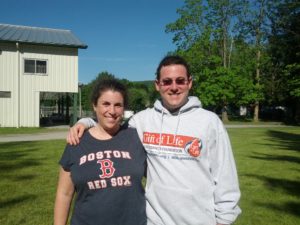By Jeffrey Schwartz. During Summer 2013, Jeff will be serving as the Head Songleader at Crane Lake Camp. Jeff was a camper, Machonik and counselor at Crane Lake Camp as well. During the Spring of 2013 Jeff was called upon by Gift of Life to become a bone marrow donor because of a camp drive that took place during Summer 2012.
Last summer, a representative from the Gift of Life Bone Marrow Registry came to Crane Lake Camp. She gave a short presentation to our staff and encouraged us to get our cheeks swabbed for the registry. The only thing I remember about it now is that the staff members at our camp, being mostly between the ages of 18-25, were of the ideal age to donate, and that there was about a 2% chance I’d make it to the next step. In less than an hour the entire task was done, and I quickly forgot that I had even participated in the drive.
One day in March, I was eating lunch in the kosher dining hall during my junior spring semester at Cornell University when I received a phone call that I was a potential match. At that point they asked me to go to the campus clinic for a blood test. There was about a 30% chance I’d be a match, and they said I’d hear back from them in six to twelve weeks after the test. They sent me a thank-you note and a lapel pin for going through with that stage. I figured I’d hear back from them around the end of the semester, and quickly forgot the whole thing once again, as I dove back into my crazy schedule.
Four weeks later, mid-April, I received another call: they were absolutely certain that I was a match for a sixty-two year old man with Acute Myelogenous Leukemia (AML). This was not what I had bargained for. On top of my regular coursework, I had a physics exam and daily rehearsals for two choral groups, and now I had to sit in on an hour-long informational conference call and skip classes to plan a last-minute flight to Detroit. In order to donate bone marrow I needed to be cleared for the surgery in the clinic where the harvest would be performed, Karmanos Cancer Center in Detroit. The cancer center in NY was closer, but it was booked until June, and the recipient of my bone marrow did not have that kind of time.
They told me during the conference call that I could opt out of the donation at any time. I found that offer very tempting. I’ll admit I wasn’t driven to donate by the sense that I was doing a really great thing. All I knew was that I was outrageously stressed out, that I was falling behind in all my schoolwork in spite of my professors being very flexible and understanding throughout the process, that I didn’t know my concert music, and that the Gift of Life people wouldn’t tell me what kind of chance the recipient would have to survive the procedure. The only thing that kept me going was the logical awareness that whatever I was going through could never be as bad as leukemia.
It might sound silly that I was so focused on school, but as a college student, I felt conditioned by the environment to believe that everything you are doing is the most important thing in the world, until something actually important pops up. Something like donating bone marrow.
Next thing I knew it was April 17th. I was in Detroit, my physics exam rescheduled to an undecided date in favor of my physical exam at Karmanos Cancer Center. That morning I had made friends with Monty the taxi driver, who had a very nice Chevy Suburban. He was the only cab driver I used during both of my trips to Detroit because he was now the first and only soul I knew in Detroit. Monty brought me to Karmanos, where I underwent a series of tests including blood tests, a chest x-ray, an EKG, and a standard physical exam. Somewhere during that time when the physician’s assistants had asked me how I was doing, I told him I was fine except that I was extremely stressed out and that I felt I didn’t have time for any of this.
Then the doctor came in to examine me. He didn’t say “hi.” He said, in a thick accent, something along these lines: “You said you don’t have time for any of this. You don’t have to do this. Why do you think you’re the only one who can donate to this recipient?” I was very confused by this statement because I never considered that there could be anyone else. To be honest, I’m still under the impression that he was lying. He continued, as if reading my mind, “I know that you’re a good guy, otherwise you wouldn’t be here. You’ll still be a good person if you decide not to do this. I’m telling you this because I’m here to look after your health, not the other guy’s. I care about the other guy’s health, but he has his own doctor to look after him. I’m here for you. If you want, you can walk out of here right now.”
I think at that point I broke down crying and told him about my coursework, exams, concerts, and that I felt Gift of Life was making the process as difficult as possible for me. And then I told him I still wanted to donate. It was then that I finally accepted that I actually had to drop everything else in order to do this.
I’ll never forget what he said after that: “You’re a good man. It’s hard to be good.” It’s not that I found this statement particularly surprising. What was so jarring about the statement was that I had said the exact same thing to one of my campers the summer before. I realized I never really knew the full meaning of the statement, “it’s hard to be good,” until that doctor said it to me in that exam room.
During the next two weeks, I traveled to Syracuse twice to donate two units of blood to myself for the procedure. Then I flew back to Detroit, this time with my Aunt Linda. I arrived in Detroit on May 1st, and then to the hospital for the procedure on May 2nd at 6 AM. Once I was there I answered some questions, put on a hospital gown, went through a few more blood tests, and fell asleep from a sedative before they even put me under anesthesia. When I came to, I hadn’t even realized they’d already performed the surgery. “Is it over?” I asked.
Once I had proven that I could walk, eat, and urinate, they discharged me from the hospital. The surgery made it difficult to bend over, walk up stairs or hills, or to stay standing for long periods of time. It also made me quite thankful that Monty had a very spacious and comfortable Chevy Suburban. I spent the next few days eating at all the nice Greek restaurants near the hotel, and I visited the Detroit Institute of Art before I left.
I spent a day at home with my parents in Philadelphia before returning to Ithaca. I spent the next two days recording with both of my acapella groups, and eventually I made up that physics exam. I was back to normal activity after a week, but couldn’t run around for a month. My grades ultimately did not suffer. It felt good that it was all over: I felt like I had done the right thing. I was proud of myself for the first time in a very long time.
Gift of Life sent me a care package with a duffel bag, a sweatshirt, some sticky notes, a lunchbox, and a nicer lapel pin, all of which had the Gift of Life logo. And they reimbursed me for my $600 of expenses from all of the traveling. That felt good; it meant that I had something to show for the whole process. Not for bragging, just for myself. It was honestly hard to admit to myself that I’ve done anything that great since my attitude was so terrible for the better part of the process. That’s the one thing I’d change if I had to go back and do it again.
About a week ago they told me that the recipient of my bone marrow was discharged from the hospital. That felt really good. It meant I hadn’t gone through the entire process in vain.
There was one more thing that the doctor told me before I left Karmanos. He said that I would be glad that I could look back on my decision to go through with the donation; I wouldn’t need to regret deciding not to donate, or wonder what might have happened if I had. He was right.
There was once a certain Rabbi Zusia of Anapol, who was frightened by a vision he had. In the vision, he learned the question that the angels would one day ask him about his life. The question wasn’t “Why weren’t you a Moses?” or “Why weren’t you a Joshua?” The question was “Zusia, there was only one thing that no power of heaven or earth could have prevented you from becoming. Zusia, why weren’t you Zusia?” Should the angels ask me a similar question one day, I can say with confidence, “In the months of April and May 2013, I was Jeff Schwartz.”

